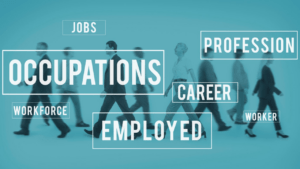
Thinking about switching careers, but not sure where to start? You’re not alone. Millions of Americans are rethinking their professional paths and diving into exciting, high-demand fields like healthcare, IT, and skilled trades.
The average person changes jobs 12 times in their lifetime, and many pivot to entirely new careers—often in their 40s, 50s, or beyond. Sectors like healthcare, IT, and skilled trades are practically rolling out the red carpet for career changers due to a skyrocketing demand for skilled professionals.
But here’s the million-dollar question: How do you turn “I want a change” into “I’ve got the job!”?
The secret lies in having a clear roadmap: understanding your strengths, targeting in-demand roles, crafting a resume that stands out, and upskilling with programs designed to get you job-ready fast.
Ready to make your career change faster, smoother, and more successful than ever? Let’s dive into the strategies that will help you land your dream job in no time.
Quick Summary
|
Why Self-Assessment Is Your Secret Weapon
Are you aware of the skills you already possess that could unlock new career opportunities?
Many professionals overlook their transferable skills when considering a career change, yet these abilities are often the key to how to change careers successfully.
The Power of Self-Assessment
Self-assessment is a critical first step in any career transition. By evaluating your current skills, experiences, and interests, you can identify how they align with roles in high-demand sectors such as healthcare, IT, and skilled trades.
According to the U.S. Bureau of Labor Statistics, healthcare and social assistance alone will add over 2 million jobs from 2023 to 2033, making it one of the fastest-growing sectors in the U.S.
Leadership, problem-solving, and communication aren’t just buzzwords—they’re gateways to new careers. For example:
- A sales professional’s persuasion skills can shine in IT sales or healthcare consulting.
- A teacher’s organizational skills can transition seamlessly into project management or corporate training.
Use AI Tools to Find Career Matches
Skip the guesswork. Try these:
- LinkedIn Career Explorer – Maps your current skills to potential new roles, with job insights and required upskilling.
- Skillroads AI Career Tool – Uses AI to match your experience with ideal career options and builds resumes too.
Pro Tip: Ask yourself, “What skills have I used consistently, regardless of job title?” That’s your career pivot clue.
Self-assessment isn’t a step—it’s the launchpad. With the right tools and reflection, you can turn your past into your future.
The Hottest Careers for Career Changers Right Now
Looking to shift into a career that’s not only in demand but also offers growth and stability? The U.S. job market is experiencing significant shifts, with certain industries expanding rapidly and seeking fresh talent. Here’s where opportunities abound—even if you’re wondering how to successfully change careers with no experience:
Healthcare: A Sector on the Rise
The healthcare industry is projected to add approximately 2.3 million jobs from 2023 to 2033, driven by an aging population and increased demand for medical services.
- Nurse Practitioners: Expected to grow by 46%, offering a median annual salary of $126,260.
- Medical and Health Services Managers: Anticipated growth of 29%, with a median salary of $110,680.
Information Technology: The Digital Frontier
As technology continues to evolve, the IT sector is expanding, with a projected growth of 10.5% from 2023 to 2033.
- Data Scientists: Projected to grow by 36%, with a median salary of $108,020.
- Information Security Analysts: Expected growth of 33%, offering a median salary of $120,360.
Skilled Trades: Building the Future
Skilled trades remain essential, with several occupations experiencing significant growth:
- Wind Turbine Service Technicians: The fastest-growing occupation with a projected 60% increase, and a median salary of $61,770.
- Solar Photovoltaic Installers: Expected growth of 48%, with a median salary of $48,800.
Real-Life Success Story
Consider the journey of Sadie Baker, who transitioned from a health occupations program participant to a registered nurse at MyMichigan Medical Center. Through dual enrollment and dedication, she secured her nursing degree early, significantly improving her financial situation and fulfilling her passion for healthcare.
Career Change Resume Tips: Stand Out in a New Field
Your resume is your story. Tell it right.
When changing careers, your resume needs to speak directly to your new industry. Here’s how to make it compelling and recruiter-ready:
1. Choose the Right Format
A hybrid or functional resume is your best friend. These formats emphasize skills and achievements over unrelated job titles. For example:
- Highlight leadership experience, technical abilities, or problem-solving successes.
- Keep your work history concise, focusing only on roles that add value to your new career path.
2. Mirror Keywords from Job Descriptions
Recruiters—and applicant tracking systems (ATS)—look for specific keywords. Use terms like “data analysis,” “patient care,” or “project management” if they’re relevant to your target role. This ensures your resume gets seen and understood quickly.
3. Showcase Relevant Certifications and Experience
Include certifications, coursework, or volunteer work that aligns with your new field. Even small details, like a coding bootcamp or a healthcare workshop, can signal your commitment to the transition.
4. Make It Instantly Clear
Ask yourself: Would a recruiter in my target field understand why I’m applying within 5 seconds of opening my resume? If not, refine your content. Add a brief career objective at the top to explain your pivot and highlight transferable skills.
For example: “Experienced educator transitioning to IT with strong organizational and training skills, plus certifications in cybersecurity.”
Tell your story confidently. A well-crafted resume can bridge the gap between where you are and where you want to be.
Networking: Build Connections to Accelerate Your Transition
Did you know that nearly 70% of jobs are never publicly posted?
That means most opportunities are found through connections, not job boards. If you’re changing careers, building a strong network can be the fastest route to your next role.
Why Networking Works
Networking Fact | Source |
| 70% of jobs are never advertised | CNBC via Apollo Technical |
| Referrals make up 40% of all hires but only 7% of applicants | Jobvite via Novoresume |
| Networking shortens job search by 1–3 months | Federal Reserve Bank of St. Louis |
| 49% of professionals struggle to keep up with networking | LinkedIn Study via Apollo Technical |
Actionable Tips to Make Networking Work for You
- Be intentional: Set a goal to reach out to 2 new professionals weekly.
- Use LinkedIn: Connect with people in your target roles. Ask questions, not just for favors.
- Join professional groups: Many industry-specific Facebook, Slack, or Meetup groups are full of advice and job leads.
- Try informational interviews: Reach out to someone in a job you want and ask, “What would you do differently if you were switching careers today?”
Real change starts with one conversation. Who can you reach out to this week?
Upskilling: Gain Certifications to Boost Your Credentials
Skills pay the bills—but only if they’re certified.
Short-term certification programs can be completed in as little as 3–6 months, making them perfect for fast-track transitions. Whether you’re exploring CompTIA for IT, CMA for healthcare, or EPA 608 for HVAC, certifications add instant credibility.
Popular upskilling routes:
- Online bootcamps (Coursera, edX, Udemy)
- Hybrid programs with hands-on components
- Evening/weekend classes for working adults
Real talk: Would you hire someone without proof of skills if you’re the employer? Certifications help answer that.
How to Successfully Make a Career Change Over 40
Considering a career shift at 40 or beyond? You’re not alone. The average age for a career change in the U.S. is 39, indicating that many professionals seek new directions mid-career.
Fields like healthcare, IT, and skilled trades are among the best careers for career changers over 40 , offering opportunities to leverage your experience and maturity while building a fresh start.
Whether you’re exploring how to successfully make a career change over 40 with no experience or looking to upskill, these industries provide clear pathways to success through certifications, hands-on training, and roles that value transferable skills.
Why It’s a Smart Move
- Experience Advantage: Your accumulated skills and insights are valuable assets in any industry.
- Time to Grow: With many planning to work into their 60s or beyond, there’s ample time to thrive in a new field.
- Renewed Fulfillment: A new career can reignite passion and provide greater job satisfaction.
Steps to Transition Successfully
- Assess Transferable Skills: Identify skills from your current role that are applicable to your desired field.
- Seek Relevant Training: Consider certifications or courses to bridge any knowledge gaps.
- Network Strategically: Connect with professionals in your target industry to gain insights and opportunities.
- Update Your Resume: Highlight relevant experiences and skills tailored to your new career path.
Remember, a career change at 40 is not just feasible—it’s often a strategic step toward a more fulfilling professional life.
Top Careers for Career Changers: Quick Entry Options
Looking to shift into a new career swiftly? Here are some high-demand roles that require relatively short training periods and offer promising growth, perfect for those exploring the best careers for career changers :
1. Wind Turbine Service Technicians
- Growth: Projected 60% increase from 2023 to 2033.
- Median Salary: $61,770 per year.
- Training: Typically requires a postsecondary non-degree award.
2. Information Security Analysts
- Growth: Projected 33% increase from 2023 to 2033.
- Median Salary: $120,360 per year.
- Training: Bachelor’s degree in a related field.
3. Nurse Practitioners
- Growth: Projected 46% increase from 2023 to 2033.
- Median Salary: $126,260 per year.
- Training: Master’s degree in nursing.
4. Data Scientists
- Growth: Projected 36% increase from 2023 to 2033.
- Median Salary: $108,020 per year.
- Training: Bachelor’s degree in a related field.
5. Solar Photovoltaic Installers
- Growth: Projected 48% increase from 2023 to 2033.
- Median Salary: $48,800 per year.
Training: Typically requires a high school diploma and moderate on-the-job training.
How CCI Training Center Can Help You Transition Faster
Ready to turn your career goals into action? At CCI Training Center, we specialize in helping adults pivot into high-demand industries—without spending years in school.
Why Career Changers Choose Us:
- Short-Term, Job-Focused Programs
Get trained in months, not years, with flexible schedules built for working adults.
- In-Demand Fields
We focus on healthcare, IT, and skilled trades—industries that are growing fast and hiring now.
- Certifications That Employers Recognize
Our programs lead to industry-recognized credentials that can immediately boost your employability.
- Hands-On Training + Career Support
Real-world practice, resume help, and job placement support mean you’re never navigating the transition alone.
- Flexible Learning Options
Choose from online, in-person, or hybrid formats to fit your lifestyle.
Whether you’re restarting, reskilling, or ready for a new challenge, CCI Training gives you the tools to move forward faster.
Conclusion: Your Career Change Journey Starts Today
Changing careers isn’t just a professional decision—it’s a bold, personal transformation. Whether you’re shifting into healthcare, exploring IT, or learning a skilled trade, the opportunities are wide open for those willing to take action.
By assessing your strengths, earning new certifications, building your network, and tailoring your resume, you’re not starting over—you’re starting smarter.
Remember:
- You’re not “too late”—you’re right on time.
- You don’t need years of experience—just the right skills and mindset.
- You don’t have to do it alone—resources, tools, and training programs are here to guide you.
So take the first step. Your ideal job isn’t just possible—it’s closer than you think.
Program Offered
- Pharmacy Technician Training
- Online Medical Assistant
- Medical Billing and Coding Specialist Program
- Cloud Computing Technician Training
- Computer Network Technician
- Business and Accounting
- Radiology Technician Training
- Medical Assistant Program
- Computer Support Technician
- Cybersecurity Program
- Virtual Assistant Training

This article is written by
Share this article
Program Offered
- Pharmacy Technician Training
- Online Medical Assistant
- Medical Billing and Coding Specialist Program
- Cloud Computing Technician Training
- Computer Network Technician
- Business and Accounting
- Radiology Technician Training
- Medical Assistant Program
- Computer Support Technician
- Cybersecurity Program
- Virtual Assistant Training

This article is written by
Share this article
Related Articles







CCI Training Center Proudly Completes
41 Years in Career Training Services












